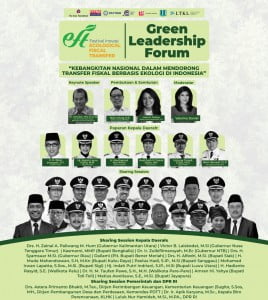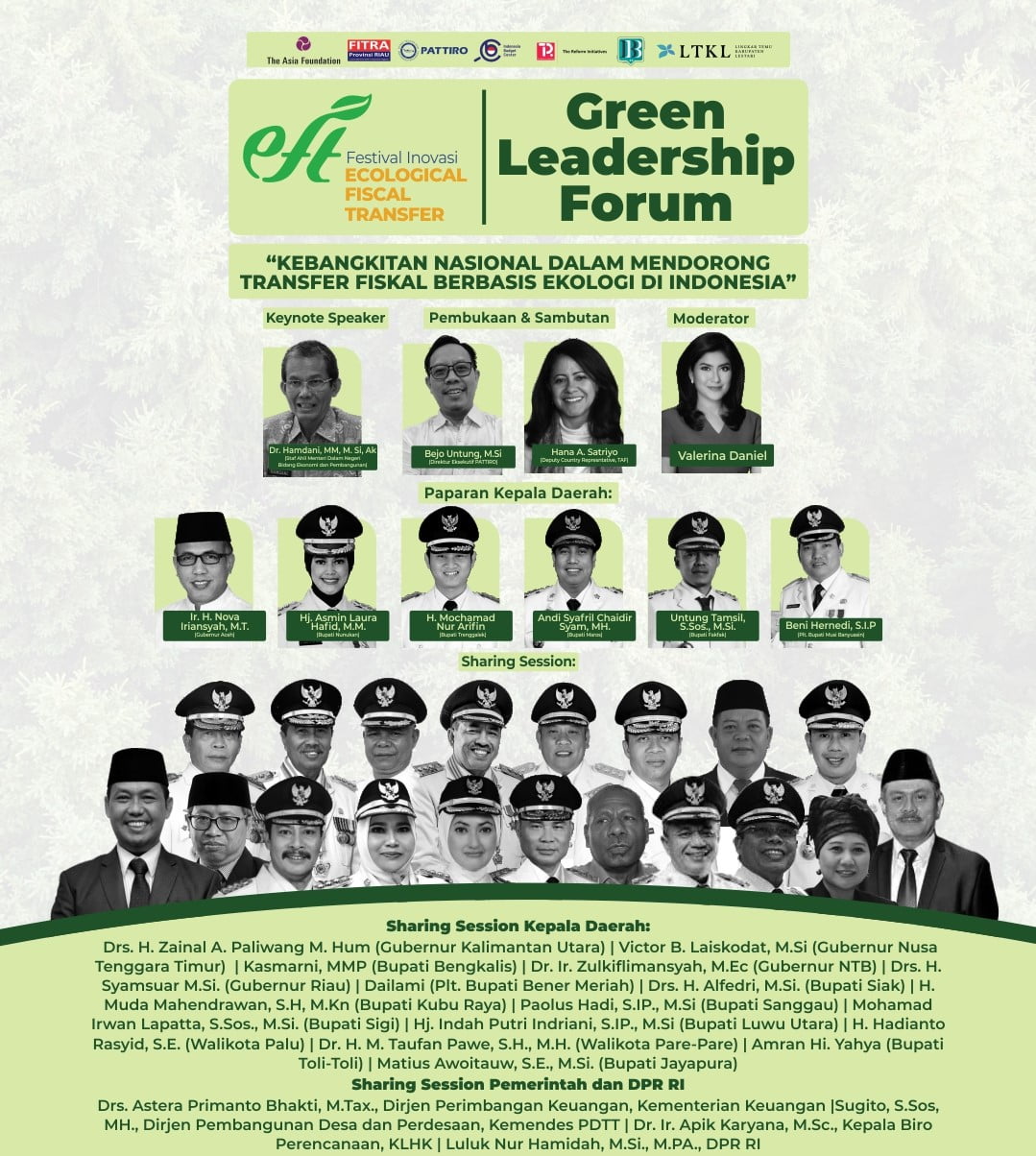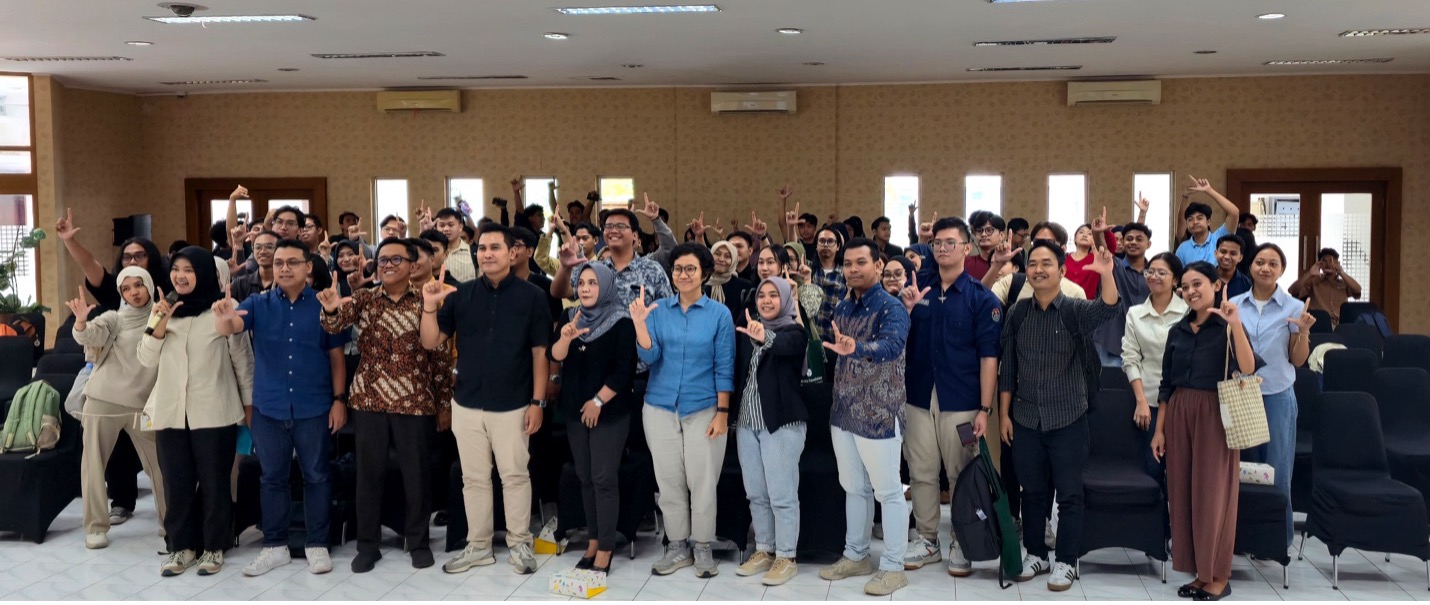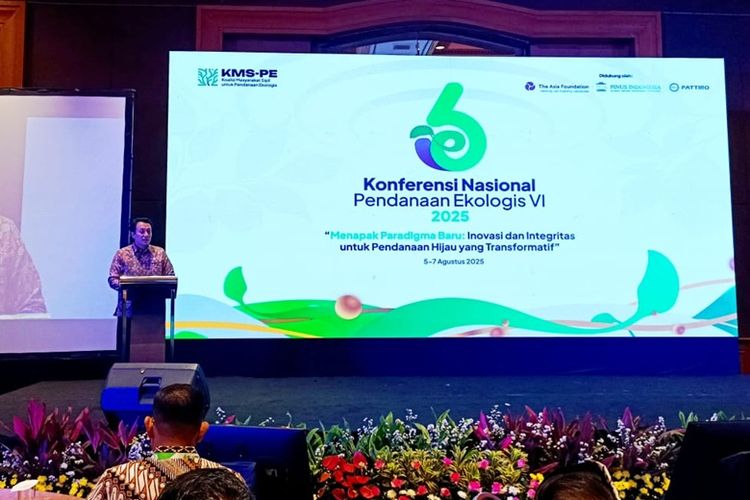 Jakarta – The Ecological Fiscal Transfer (EFT) scheme is considered quite successful in encouraging environmental conservation in many areas in Indonesia. This was stated by several regional heads, both those who have implemented EFT or who are considering it, in the Green Leadership Forum (GLF) organized by the Center for Regional Research and Information (PATTIRO) in collaboration with the Civil Society Coalition and supported by The Asia Foundation, Wednesday (27/10).
Jakarta – The Ecological Fiscal Transfer (EFT) scheme is considered quite successful in encouraging environmental conservation in many areas in Indonesia. This was stated by several regional heads, both those who have implemented EFT or who are considering it, in the Green Leadership Forum (GLF) organized by the Center for Regional Research and Information (PATTIRO) in collaboration with the Civil Society Coalition and supported by The Asia Foundation, Wednesday (27/10).
Based on the explanation of the Governor of Aceh, represented by the Head of the Environment and Forestry Service (DLHK) of Aceh Province, Mr. A. Hanan, through the Ecology-based Provincial Budget Transfer (TAPE) scheme, the Provincial Government of Aceh has succeeded in improving several things related to the environment. These include increasing land cover, developing community forest parks (Tahura), preventing and controlling land and forest fires, increasing green open spaces, managing waste, and so on.
For waste management, Hanan said that his party has collaborated with private companies and is handled directly by the Aceh Office of Environment and Forestry, so that it can be more optimal. “Above all, we also have the Aceh Green program, which is intended to create a better environment and become environmentally friendly. These have been accommodated in Aceh’s RPJM,” he said.
Hanan’s explanation seemed to answer the expectations of PATTIRO Executive Director Bejo Untung. In his speech, Bejo said that he had high hopes that the EFT scheme could be implemented and put to good use. “Hopefully, we can discuss and share many things here, including building communication with each other to encourage and intensify the implementation of EFT,” said Bejo in the forum hosted by Valerina Daniel.
Not much different from the Governor of Aceh, who was represented by the Aceh DLHK, was the Regent of Trenggalek, Mochamad Nur Arifin. In the forum attended by Expert Staff of the Minister of Home Affairs for Economics and Development Hamdani, PATTIRO Executive Director Bejo Untung, and Deputy Country Representative of The Asia Foundation (TAF) Hana A. Satriyo, represented by Deputy Director of Environmental Governance Alam Surya Putra, Nur Arifin shared a good story from Trenggalek regarding the Ecology-based District Budget Transfer (TAKE).
The Trenggalek District Government uses TAKE as an incentive for villages that are committed to the environment in their area. More generally, the Trenggalek District Government also has what Nur Arifin calls the Special Financial Assistance (BKK). The BKK, said Nur Arifin, consists of three models, namely affirmative, delegative, and incentive.
The incentive model refers to funds that can be contested by villages in Trenggalek. Villages that meet 8 (eight) determined indicators are the ones who are entitled to receive the incentives. “Because of this model, those villages have village regulations for conservation, essential ecological zone program, and so on, that are out of ordinary and support the preservation of the environment,” he explained. However, he hopes that in the future the Provincial Government and the Central Government can make the assessment components for regional incentive funds more varied and have greater weight for the environment.
Environmental budget still far from enough
Meanwhile, in the forum that was also initiated by the Indonesian Forum for Budget Transparency (FITRA) Riau, Indonesia Budget Center (IBC), The Reform Initiatives (TRI), Lingkar Temu Kabupaten Lestari (LTKL), and Beritabaru.co, Luluk Nur Hamidah as the representative of the DPR RI as a responder, stated her regret that despite the enthusiasm of regional heads regarding environmental conservation, the budget is still very small.
According to Luluk, to this day the portion of the budget allocated for environmental conservation is still very low. “Only 0.9% is allocated for the environment. This is very different from Brazil, which has budgeted 10% of the general allocation fund to be able to provide support to regions based on ecology. Value Added Tax is returned back to regions that have a strong commitment to efforts to protect the environment, preserve the environment, and other environmental performances.” she said.
Work to improve the quality of the environment, Luluk continued, is actually work to save life itself and to ensure that future generations can get a better quality of life. From there, Luluk thinks that the budget for the environment deserves more attention. This issue should be beyond debate. Environmental issues should not be marginalized, much less contradicted.
“We can’t contrast the environment and investment, the environment and agriculture, and the like. This is about the future of our own lives,” said Luluk.
The forum, which was broadcast live via the Infopattiro YouTube Channel, was attended by the Governor of Aceh, represented by the Head of the Aceh Environmental and Forestry Service A. Hanan, the District Head of Nunukan Asmin Laura Hafid, the District Head of Maros Andi Syafril Chaidir Syam, the District Head of Trenggalek M. Nur Arifin, the District Head of Southwest Aceh Akmal Ibrahim, the Mayor of Sabang Nazaruddin, and many other regional heads who have either implemented EFT or are in the process of adopting it.
It should also be noted that the 2nd GLF carried the theme “National Awakening in Encouraging Ecology-Based Fiscal Transfers in Indonesia”.






